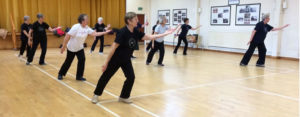Slow Mental Decline in the Elderly with Tai Chi
By John M. de Castro, Ph.D.
“improvement of heart function combined with increased muscular power meant that the martial art should be considered the preferred technique for elderly people to maintain good health.” – The Telegraph
We celebrate the increasing longevity of the population. But, aging is a mixed blessing. The aging process involves a systematic progressive decline of the body and the brain. Every system in the body deteriorates including cognitive function (thinking ability) and motor function with a decline in strength, flexibility, and balance. It is inevitable. In addition, many elderly experience withdrawal and isolation from social interactions. There is some hope as there is evidence that these declines can be slowed. For example, a healthy diet and a regular program of exercise can slow the physical and cognitive decline of the body with aging. Also, contemplative practices such as meditation, yoga, and tai chi or qigong have all been shown to be beneficial in slowing or delaying physical and mental decline.
Tai Chi has been practiced for thousands of years with benefits for health and longevity. Tai Chi training is designed to enhance function and regulate the activities of the body through regulated breathing, mindful concentration, and gentle movements. Only recently though have the effects of Tai Chi practice been scrutinized with empirical research and found to be effective for an array of physical and psychological issues. Tai Chi has been shown to help the elderly improve attention, balance, reducing falls, arthritis, cognitive function, memory, and reduce age related deterioration of the brain. Because Tai Chi is not strenuous, involving slow gentle movements, and is safe, having no appreciable side effects, it is appropriate for all ages including the elderly and for individuals with illnesses that limit their activities or range of motion.
In today’s Research News article “Tai Chi Improves Cognition and Plasma BDNF in Older Adults with Mild Cognitive Impairment: A Randomized Controlled Trial.” Sungkarat and colleagues recruited elderly participants with mild cognitive impairments and randomly assigned them to either receive educational instruction related to cognitive impairment and fall prevention or practice Tai Chi at home guided by a 50-minute video, 3 times per week, for 6 months. They were measured at the beginning and end of training for cognitive performance, including memory, visuospatial ability, and executive function, and plasma markers for inflammation and neuroprotection, including plasma BDNF, TNF-α, and IL-10 levels.
They found that compared to baseline and control participants, the elderly who practiced Tai Chi had significantly improved levels of cognitive function, including improvements in memory and thinking ability (executive function). In addition, Tai Chi practice was found to significantly increase the levels of brain-derived neurotrophic factor (BDNF). BDNF is a neurotrophic factor that works to protect the brain from deterioration and promote the growth of brain cells. Hence, they found that Tai Chi practice reduces cognitive decline with aging and increases neuroprotection.
The cognitive decline with aging has been associated with degeneration of neural tissues. On the other hand, mindfulness practices have been found to change the brain and protect it against age related decline. The present results add further evidence that mindfulness practices, Tai Chi in particular, improves memory and cognitive performance and promotes neuroprotection in the elderly. The attractiveness of the low intensity, low cost, convenient, and socially fun nature of Tai Chi practice makes it a great treatment for the prevention of age related decline.
So, slow mental decline in the elderly with Tai Chi.
“Scientists . . . found increases in brain volume and improvements on tests of memory and thinking in Chinese seniors who practiced Tai Chi three times a week.” – Science Daily
CMCS – Center for Mindfulness and Contemplative Studies
This and other Contemplative Studies posts are also available on Google+ https://plus.google.com/106784388191201299496/posts and on Twitter @MindfulResearch
Study Summary
Somporn Sungkarat, PhD, SirinunBoripuntakul, PhD, Sirinart Kumfu, PhD, Stephen R. Lord, PhD, Nipon Chattipakorn, MD, PhD. Tai Chi Improves Cognition and Plasma BDNF in Older Adults With Mild Cognitive Impairment: A Randomized Controlled Trial. Neurorehabilitation and Neural Repair. First Published January 20, 2018, https://doi-org.ezproxy.shsu.edu/10.1177/15459683177536
Abstract
Background. Effects of Tai Chi (TC) on specific cognitive function and mechanisms by which TC may improve cognition in older adults with amnestic mild cognitive impairment (a-MCI) remain unknown. Objective. To examine the effects of TC on cognitive functions and plasma biomarkers (brain-derived neurotrophic factor [BDNF], tumor necrosis factor-α [TNF-α], and interleukin-10 [IL-10]) in a-MCI. Methods. A total of 66 older adults with a-MCI (mean age = 67.9 years) were randomized to either a TC (n = 33) or a control group (n = 33). Participants in the TC group learned TC with a certified instructor and then practiced at home for 50 min/session, 3 times/wk for 6 months. The control group received educational material that covered information related to cognition. The primary outcome was cognitive performance, including Logical Memory (LM) delayed recall, Block Design, Digit Span, and Trail Making Test B minus A (TMT B-A). The secondary outcomes were plasma biomarkers, including BDNF, TNF-α, and IL-10. Results. At the end of the trial, performance on the LM and TMT B-A was significantly better in the TC group compared with the control group after adjusting for age, gender, and education (P < .05). Plasma BDNF level was significantly increased for the TC group, whereas the other outcome measures were similar between the 2 groups after adjusting for age and gender (P < .05). Conclusions. TC training significantly improved memory and the mental switching component of executive function in older adults with a-MCI, possibly via an upregulation of BDNF.
http://journals.sagepub.com.ezproxy.shsu.edu/doi/full/10.1177/1545968317753682
